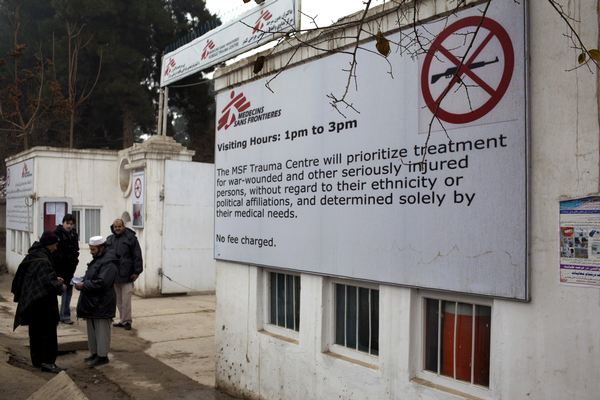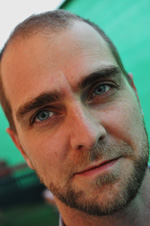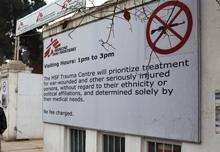A young boy with a skull fracture needs to be transported to Kabul for treatment. You don't have a spare ambulance. What do you do? MSF doctor Stefan Kruger blogs from Afghanistan.

Afghanistan 2012 © Michael Goldfarb
The entrance at the MSF trauma center in Kunduz.

MSF doctor Stefan Kruger
Doctor Stefan Kruger joined Doctors Without Borders/Médecins Sans Frontières MSF) in 2012 and currently works in the Emergency Department of MSF’s Kunduz Trauma Center. The hospital is the only one of its kind in northern Afghanistan, providing high quality and free surgical care to victims of general trauma as well as those with conflict-related injuries from bomb blasts or gunshots. Read more from Stefan and the rest of MSF's Afghanistan blogging team here.
No one said it was easy working in Afghanistan. This patient, for example, has a head injury with a large fracture of the skull. The open wound and broken fragments of skull are an entry point for all kinds of infections, but the position of the fracture makes it tricky – it overlies one of the great venous sinuses, which, if perturbed, can give rise to catastrophic bleeding. Consensus is reached that this injury ought not to be touched in our trauma center. The young boy has been stabilized as much as possible and his level of consciousness is surprisingly good for the moment. But the clock is stubbornly ticking away. Now what?
We know that there is a specialized neurosurgical department at one of the hospitals in Kabul. From Kunduz, it is a 350 kilometer [about 217 miles] trip but the road is in poor repair and it will take a minimum of eight hours. We have one ambulance, but sending it to Kabul is not allowed because it would significantly impact all other activities in our trauma center. Transport by air is not possible either.
We have only one option: the patient is to be transferred by taxi. From Kunduz they will take the A76 Asian highway and turn toward Kabul at the Salang pass. The pass is the main connection between Kabul and Northern Afghanistan. At an altitude of 3,878 meters [12,720 feet], it traverses the Hindu Kush Mountains with their snow capped peaks all year round. From the pass it should take another hour or two to reach the capital. From what we understand, the pass is closed at 6:00 PM every day for a combination of maintenance and security reasons. This means that the taxi needs to leave Kunduz by no later than 1:00 PM. It is 11:00 and the team begins making arrangements as if their own lives depended on it.
The field coordinator reviews our plan and obtains special permission from the head of mission. Logisticians manage to find a taxi driver, with a station wagon, who is willing to drive to Kabul and back. We find a nurse who is willing to accompany the patient in the car. (Unfortunately, for security reasons, expats are not allowed any travel by road outside of Kunduz. In this case the expat would not just be placing himself at risk but also the patient and his parents.) We pack a box with supplies for basic life support, some drugs, IV fluids, oxygen masks, and a portable suction machine to ensure the patient’s airway remains clear. When the taxi arrives, everyone helps and it is soon transformed into a makeshift ambulance. The cleaners clean out the back of the station wagon, the stretcher-bearers find a small mattress for the patient to lie on, and the radio room operators help to bring two large oxygen bottles and fit them into the car like Tetris blocks.
The patient’s father watches as we load his son into the back of the taxi. He understands that this is an incredibly risky transfer and that anything might happen on the way. He also understands that we have reached the limit of our therapeutic capabilities in Kunduz, and keeping his son in our hospital would guarantee a poor outcome. He is grateful for our trouble and comes to thank everyone personally before he joins his son in the car. They leave the gates of the hospital at 12:40.
The nurse calls us from the back of the taxi at 10:00 PM to say that they have successfully cleared the Salang pass, but they were held up at a road block for almost an hour. The patient, thankfully, has not deteriorated at all. At midnight they arrive in Kabul and our patient is admitted. His condition is stable, but he is certainly not out of danger.
Sincerely, I think we will have to wait and see whether we have helped this boy or simply shifted the problem to another hospital. But the team is hopeful and they will take pride in the fact that they gave their best effort.
The patient's father gave permission to take the photos and for MSF to use them the internet.




